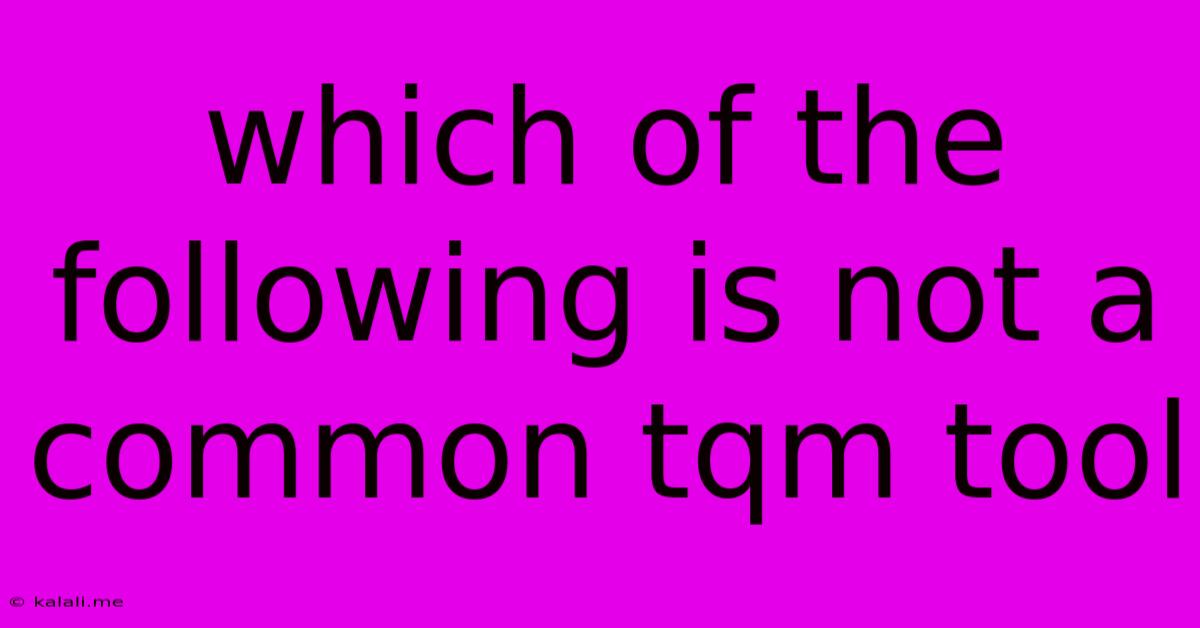Which Of The Following Is Not A Common Tqm Tool
Kalali
Jun 15, 2025 · 3 min read

Table of Contents
Which of the following is NOT a common TQM tool? Understanding the Core Principles of Total Quality Management
Total Quality Management (TQM) is a holistic management approach dedicated to achieving continuous improvement and customer satisfaction. This involves a comprehensive suite of tools and techniques designed to identify and address quality issues throughout an organization. However, not every management tool falls under the TQM umbrella. This article explores common TQM tools and highlights one that doesn't typically fit the framework.
Understanding the Core Tools of TQM
Effective TQM implementation relies on a variety of methodologies, all aimed at fostering a culture of continuous improvement and exceeding customer expectations. Some of the most frequently used TQM tools include:
- Statistical Process Control (SPC): This involves using statistical methods to monitor and control processes, aiming to minimize variation and improve efficiency. SPC charts, such as control charts, are crucial for identifying trends and anomalies.
- Six Sigma: A data-driven methodology focusing on reducing defects and improving processes to achieve near-perfection (six standard deviations from the mean). Six Sigma utilizes tools like DMAIC (Define, Measure, Analyze, Improve, Control) for structured problem-solving.
- Pareto Charts: These charts visually represent the frequency of various causes of problems, helping prioritize improvement efforts by focusing on the "vital few" rather than the "trivial many." They are invaluable for identifying the root causes of quality issues.
- Cause-and-Effect Diagrams (Fishbone Diagrams): These diagrams visually organize potential causes of a problem, aiding in brainstorming and identifying root causes. This collaborative approach encourages team problem-solving.
- Check Sheets: Simple yet powerful tools for systematically collecting data, providing a structured method for recording observations and identifying trends.
- Flowcharts: Visual representations of processes, used to identify bottlenecks, inefficiencies, and areas for improvement. They offer a clear picture of how a process functions.
Identifying the Outsider: Project Management Software
While effective project management is crucial for any organization, and many aspects overlap with TQM principles, project management software itself is not a TQM tool. Project management software, such as Asana, Trello, or Monday.com, provides tools for task management, scheduling, collaboration, and resource allocation. Although helpful in managing projects related to TQM initiatives (such as implementing a new quality control system), the software itself doesn't directly address quality improvement methodologies.
Think of it this way: project management software is a tool for managing the implementation of TQM tools and strategies. It's a facilitator, not a core methodology for achieving quality improvement. It helps organize the process of TQM, not the principles of TQM itself.
The Importance of a Holistic Approach
Successfully implementing TQM requires a comprehensive strategy integrating various tools and techniques tailored to the organization's specific needs. It's crucial to understand the core principles of continuous improvement, customer focus, and employee empowerment. While project management software can contribute to the efficiency of TQM initiatives, it doesn't replace the core methodologies necessary for achieving sustainable quality improvement. Choosing and implementing the right mix of tools, combined with a strong organizational commitment to quality, is key to TQM success.
Latest Posts
Latest Posts
-
What Are All The Factors For 75
Jun 15, 2025
-
The Main Nitrogenous Waste In Urine Is
Jun 15, 2025
-
What Is The Second Most Abundant Gas In The Atmosphere
Jun 15, 2025
-
The Most Abundant Molecule In The Cell Is
Jun 15, 2025
-
What Is The Multiples Of 50
Jun 15, 2025
Related Post
Thank you for visiting our website which covers about Which Of The Following Is Not A Common Tqm Tool . We hope the information provided has been useful to you. Feel free to contact us if you have any questions or need further assistance. See you next time and don't miss to bookmark.